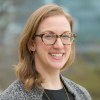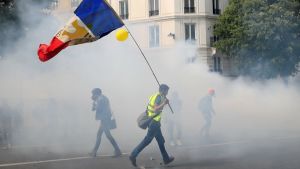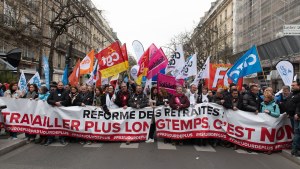Balancing Religious Diversity and National Identity in France
 Play Podcast
Play Podcast
About the Episode
The expulsion of Muslim schoolgirls for refusing to remove their abayas serves as a stark reminder of France's ongoing struggle to balance its historical commitment to laïcité with its growing religious and cultural diversity. The Council’s Ariel Schwartz joins host Brian Hanson to explore laïcité’s historical roots, modern challenges, and global implications in contemporary society.
[Brian Hanson: INTRO: This is Deep Dish on Global Affairs going beyond the headlines on critical global issues. I'm your host Brian Hanson with the Chicago Council on Global Affairs.
Recent headlines about France's ban in schools for wearing abaya style dresses, often worn by Muslim women and girls, have once again brought the country's approach to secularism into the global spotlight. France's brand new education minister, Gabriel Attal made the announcement…
(SOUNDBITE OF ARCHIVED RECORDING)
This controversy has reignited a larger conversation. about how France views religion in the context of its national identity. And there is much confusion over how to understand secularism in France and decisions to prohibit wearing religious symbols and clothing in schools. And as the relationship between religion, nation states, and politics drives important events in many parts of the world, we need to learn how to understand what secularism means and how it's practiced, not only in France and the United States, but elsewhere to understand what's happening around the world. Today, we're diving into the complex world of French secularism known as laïcité by unraveling its historical roots and modern day implications.
To help me explore these issues is one of the Chicago Council on Global Affairs own experts, Ariel Schwartz. Ariel is director of the Emerging Leaders Program, the Council's signature global leadership development program she also holds a PhD in religious studies and is taught at both Lake Forest College as well as Northwestern University.
Now, for many Americans, our starting point for thinking about secularism is the idea of the separation of church and state. But that doesn't really capture what secularism means in France. The term actually comes from Latin origins and means…]
Ariel Schwartz: century, or age, and it was originally used within the Christian church as a way to distinguish between worldly priests, those who are operating outside in the world amongst people, and those who are enclosed within church quarters, and so the secular, the concept, actually emerges from within Christianity, and during the period of enlightenment, it moved from adjective to a noun, to secularization, to the concept of rationalization, modernization, the separation of religion, the so called non-rational. You know the removal of that irrationality, so to speak, from, day to day life and the modern society, that was enlightened and so called secular. And so, under the developing French nation state, I think that the term laïcité is actually a better term to use, and the reason is it is distinct from other forms of secularism, which have their own names and terms.
Brian Hanson: Yeah. And how does this idea unfold and develop in France to come to mean what it does?
Ariel Schwartz: So laicite has to do with the lay people. And the idea is that during the formation of the French nation state, France was concerned with elevating the French nationality, the French citizenship as a cohesive unit. And so, their target was really to segregate the Catholic Church, which for so long had been the exclusive state religion of France up until 1791 and this is religious freedom was affirmed in 1789 with the French Declaration of Rights of Man and Citizen. And so, this was really a way of saying religion lives in this corner, it is separate from the Catholic Church, is separate from the French state, and we need to delineate the boundaries of religion from the boundaries of what it means to be a French citizen.
Brian Hanson: I know with the revolution, there was a pushback against the church that had so much power, how would you characterize as this term has evolved, the relationship that's then established by laicite between the state and religions?
Ariel Schwartz: Yeah, so the question of where religions, plural, and I'm glad you put it that way, because religion is not a universal, homogenous concept, let alone practice. But the idea for France is really that their version of secularism, laïcité, says that religion lives in the private spaces. Public spaces are where one is most French and where ideas of Frenchness are most reiterated. And so, the idea really is that people are free to have their religious practice. They're free to have their freedom of conscience is what's actually delineated in the law of 1905 which officially segregated the Catholic Church from the government and affirmed free exercise of religion in private spheres. But this is really where they outline that there will be no state run public worship that there's no financial support for worship and that no religious principles can be invoked for disobeying the law. And so really being able to say religion is segregated to private practice in your private homes, your private lives, your private entities. And when you're in public schools, when you're in spaces of government, that's the space where sort of religion needs to be tucked away, made less visible. Made less present than one's sense of being part of the French community where Frenchness freedom of thought are privileged.
Brian Hanson: So, if I understand this right, really the emphasis then on the French conception is that there is a nation and it can hold in it people from all kinds of different religious backgrounds and all, but in order to establish that nation and that sense of identity as French people, there's been an intentional kind of development of this idea, this set of practices to exclude religion and therefore bringing symbols of religion that drive those differences into a public setting like a school is actually seen as kind of tearing apart Talk about this a little bit. how does that work?
Ariel Schwartz: Yeah. So, the end game here is really public unity, where diversity is seen in so many ways as the opportunity for fracture, for fragmentation within society. And I know this might sound pretty bizarre to Americans who think of diversity as central to our unity, right, the e polaribus unum concept. but in France it's really different. This is really all an effort to prevent social fracture. Now, of course, different communities are treated differently in France, so when you say how this has affected religions, and religious communities in France, it is not even and equitable across the board.
Brian Hanson: So, how do you mean that it's inequitable and kind of what happens?
Ariel Schwartz: To be clear about when this emerges, in 2003/2004, the Stasi Commission issued a report, and determined that religious symbols in public were a threat to public order. And so that's where the ban on religious symbols and garb emerges, and that specifically is Sikh turbans, Jewish kippot or yarmulkes, large Christian crosses. But the impact was primarily felt amongst schoolgirls who are wearing hijab. And so, in 2004, the crackdown was mostly on young women's, the policing of female bodies in public spaces, and specifically female Muslim bodies. And so, this comes out of its own history about France and colonialism, also about France and race, also about the weaponization of women's bodies in challenges around Islam and around race.
Brian Hanson: As I think about that time period, I also think about 9/11/2001 and the terrorist attack in the United States and certainly the strong reaction that happened in this country, including, violations of rights of Muslims here. Did that play into any of this movement in order to push religious symbols out of schools?
Ariel Schwartz: In short, yes, but the history is longer than that. I keep saying we need to go back further because things do date back so much further. Anti-Muslim sentiments date back to France's historical relationship with North African countries. Um, Tunisia, Algeria, Lebanon, Syria, Morocco, which they'd colonized. And so during the decolonization period, there was a large immigration to France in the 1950s, 1960s, and that influx into France of populations from North Africa, meant that there were all these Islamophobic and racist sentiments that were then commingling with concerns about crime and poverty and unemployment and many of the same themes that we hear discussed at present, whether it's in the United States or in France or elsewhere in Europe.
Brian Hanson: I guess the thing that strikes me is there is this underlying longer term idea about how do you create a coherent nation that doesn't fracture along a range of things. We're talking about religion, but it also in the French conception applies to race, as well. Some people have characterized this as explicitly an anti-Muslim effort to marginalize oppress the Muslim population in France, is that the best way to understand it? Or is it more complex than that?
Ariel Schwartz: It's really complex. Has laicite singled out Muslim communities in France? Yes, definitively. Is it as simple as the desire to cohere a sense of unity in France? No, right? Part of it is the initial, sort of, migration that I described, the socioeconomic challenges, the racial problems, you know, discrimination and outright violence against minority populations, immigrant populations. But then as you had mentioned, you spoke a little bit about 9/11. There was also the second intifada in Israel around the same time and there was a lot of popular support amongst Muslim communities, for Palestinian communities, followed by a spate of terrorist attacks in the 21st century. And most prominent among those being the 2015 shootings at the satirical newspaper, Charlie Hebdo. And then, the coordinated attacks amongst a number of different venues, but most prominently the Bataclan music venue, that killed in total 130 people. And so, these multiple violences and movements and uprisings really, placed the French government into a position of over securitization.
Brian Hanson: Sounds familiar.
Ariel Schwartz: It sounds familiar, right? Yeah. Yeah. And so, there's also an element here of how do we literally protect the French state and the French people? I want to be clear. I'm not falling on the side of over securitization that targets Muslim communities. That was absolutely a consequence of this slate of Islamist attacks. And so, in 2021, they actually passed a law known as the Paty Law. It's named after Samuel Paty. It was a teacher who was beheaded outside of his school west of Paris by a Chechen Islamist who was unhappy about the professor's display of cartoons of the Prophet Muhammad. It was a class about freedom of expression, so it sort of also elevated this essential component of the French democratic nation state, and this law is also known as, like, confirming respect for the principles of the Republic, or is known as an anti-radicalism bill or an anti-separatism bill, so all these are, like, similar namings of the same entity, but this strengthened oversight of mosques, schools, sports clubs, et cetera, in the name of safeguarding France and ensuring respect for French values. It absolutely explicitly targets the Muslim communities of France.
Brian Hanson: One of things that's really interesting to me about this and how it's played out in France, and now with this dress, which is, I understand it isn't even really religious per se.
Ariel Schwartz: It's really more of loose fitting cloak. floor length. It's long. It's sort of like a cloak or robe might be more appropriate to say than dress. Cause in some communities, it's not exclusive to Muslim women, but there's frequently Muslim women and sort of in that same through line of targeting Muslim women's bodies as the site of, around which, laicite and conversations about laicite play out.
Brian Hanson: Why is it schools that are the site of this? I mean, when you laid this out, you talked about public life and public spaces where this is, in the French conception, it's the unity without the fracturing. Why have we seen this particularly occur in schools?
Ariel Schwartz: I mean, for the same reason that we're seeing controversies play out in our schools in the United States, right, around critical race theory in elementary schools, which is not being taught in elementary schools, around, you know, what books are in libraries. It's because young children are both little sponges and also future grown citizens of the nation state. And so, Schools are the space where our future citizens are forged, where French future citizens are forged. And so, that's the space where, especially in France, with the desire to separate religion out of public life, it especially becomes so much more emphasized, to remove religious garb, religious symbols from schools, so that there's a quote unquote safe space for the cultivation of French values, for the prioritization of Frenchness, over anything else.
Brian Hanson: So, since you just touched on the United States, I would love to get your help unpacking and comparing a bit this idea of French laïcité, which we've been talking about and then the US conception of secularism, because what we see is different issues, happening, right? If you wear religious symbols to school, isn't an issue in the United States, whether you have prayer in school, mandated prayer in school, that is a big issue in the United States. How do these different ideas about secularism lead to different, set of politics and a different set of controversies?
Ariel Schwartz: Well, as you might imagine, it goes back to the history of the founding of the nation state, right? I feel like a broken record, but, uh, when you think about the creation of the United States, when you think about the formation our country, it really came back to a distancing from England. And from the Church of England, and so it was not exclusively a reason for our founding, but it was not the reason, but it was a reason, which was a desire to practice religion as they wanted, to practice Christianity as they wanted, really. And so, in part, one of the foundational principles of the United States is a dedication to free exercise of religion, Now, again, to be clear, it's about the free exercise of Christianity from the get-go. So, that shows up in interesting ways later in our history and plays out in the Supreme Court in a number of different ways. But at its core, our country is equally as invested in preventing the establishment of religion by the state or by the federal government as it is in the free exercise of religion for each individual. And so, the way that that often plays out is that the reason that there's a prevention around establishment of religion is to be able to offer up expanded capacity for free exercise. So, the state can't infringe on the rights of individual Americans, which is really different than a French laicite that says that the state and public spheres need to be free of religion, whereas we have in the United States a freedom to practice religion, and that the government cannot infringe upon that.
Brian Hanson: It's interesting. I'm also hearing in your answer that in the US, because it's this individual, level and freedom, people can bring it into public spaces, government. You can wear religious symbols, you can bring religious ideas, religious bases into public debates in the US in a way that in France it would be seen as destructive of kind of building a common French state. Whereas here it was so integral, to all of that.
Ariel Schwartz: Which is not always the case, right? So, early on in US history, there was a clear delineation around where the state could not establish religion, and so that meant where government funds could not go to support religious practice of any variety. This is dating back to, like, 1962, Engel v. Vitale, public schools couldn't require students to recite prayers. This follows through in, I mean, the big one is really 1963, School District of Abington Township, Pennsylvania v. Shemp, where teachers can't lead students in prayer and students couldn't read the Bible in class as part of a prayerful practice. But that's something that shifts, pretty distinctly into the 21st century and really very recently, this has been affirmed in so many ways, but two cases from 2021 really underscored individual rights to exercise their religion, even through government funding and government support. So, for instance, Kennedy v. Bremerton School District, affirmed the right of a football coach to offer prayer after a game. Or in Carson v. Macon, states can't exclude private religious schools from receiving public funding only because of their religion. So there's been a turn more recently to affirm, government funded free exercise, which gets us into a tangled and messy zone and it might be a good time also to mention that it's equally tangled and messy, but in a different way in France. Which is that things like nativity scenes and crucifixes, and even public displays of the passion of the Christ have all been allowed in recent years in France, but also elsewhere in Europe, not as religion, but as culture. And so, t here's been a resurgence of religion in the public sphere in these specific ways because it is seen as part of French culture. And so, this gets into a really, as you might imagine, really messy space. And it makes me ask a lot of questions about, as you mentioned, the abaya is often not seen as religious garb, not Muslim garb, but might be cultural garb. And so, where and how are arguments made around what counts as cultural heritage and what counts as religious practice?
Brian Hanson: As we close, what would you encourage, particularly in this case in France, for Americans, as we observe these kinds of controversies happening between the state, religion and politics, what do we need to keep in mind as we seek to understand what's going on and what's driving the events in France or other places?
Ariel Schwartz: I would ask everyone to ask yourselves, how are religion and secularism being deployed in each of these instances. Who are they serving because religion and secularism don't operate, they're not actors themselves. Whether it's the French state extending its ban on religious garb to abayas or the US allowing for prayer on a football field in a public school, or the potential renaming of India to Bharat, which is the Hindi Sanskrit for India. These are all tools of people who are interested in asserting a particular project of the modern nation state.
Brian Hanson: Ariel Schwartz of the Chicago Council on Global Affairs. I want to thank you so much for coming on Deep Dish to help us understand these differences and ideas about secularism, how they play out in the world and why they matter.
Ariel Schwartz: Thanks for having me.
[Brian Hanson: OUTRO: And thank you for tuning in to this episode of Deep Dish.
A reminder that we want to hear more from you, our listeners. So, send us an email or, better yet, a voice memo, to deepdish@globalaffairs.org You can suggest issues you’d like us to cover, guests you’d love to hear from, or you can just let us know how you think we’re doing.
And if you are looking for more Deep Dish in your podcast diet? Tap the “follow” button in your podcast app so you get each new episode as it’s released. If you think you know someone who would enjoy today's episode, please "share" it with them!
As a reminder, the opinions you heard belong to the people who expressed them and not the Chicago Council on Global Affairs. This episode is produced and edited by Kyra Dahring and mixed by Frank McKearn of Aphorism Productions.
Thank you for listening. I’m Brian Hanson and we’ll be back next week for another slice of Deep Dish.]




Related Content
 Global Politics
Global Politics
French geographer Christophe Guilluy has a controversial diagnosis of working-class resentment in the age of Trump, Brexit, and the Yellow Vests.
 Global Politics
Global Politics
Jamil Anderlini, Ryan Heath, and Elise Labott join Ivo Daalder to discuss the week's top news stories.
 Global Politics
Global Politics
Bethany Allen-Ebrahimian, Roger Cohen, Bobby Ghosh, Anton La Guardia join Ivo Daalder to discuss the week's top news stories.
